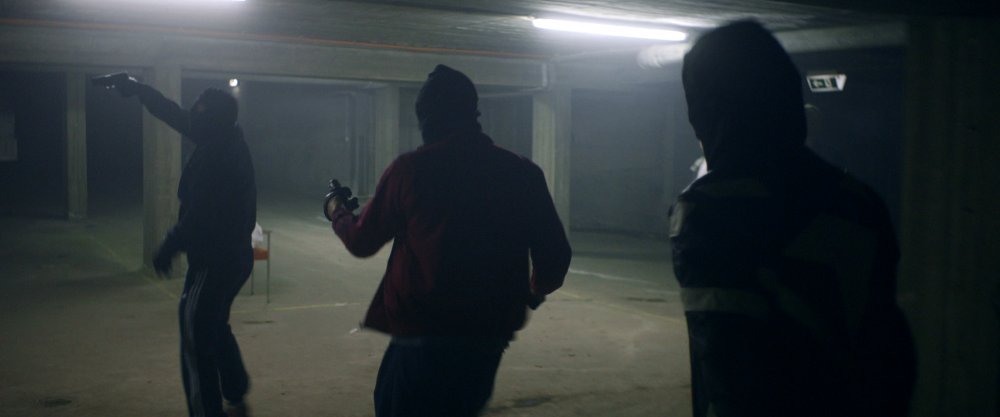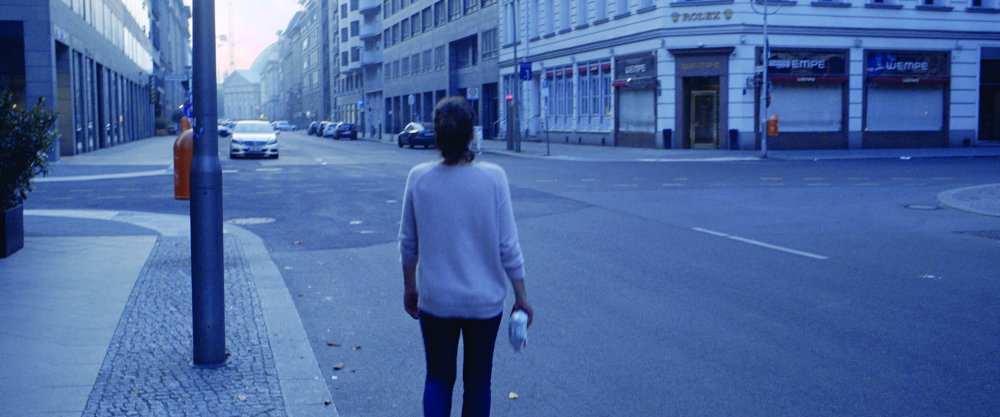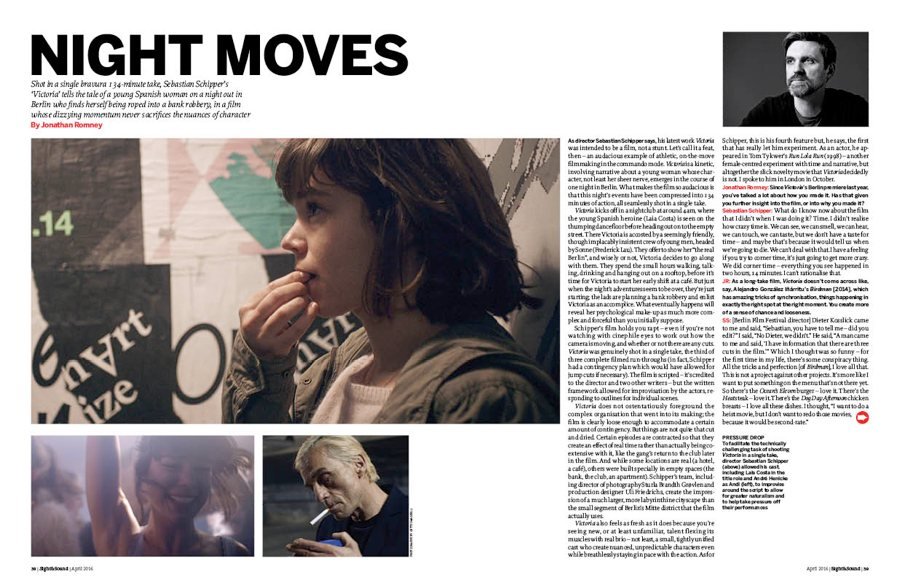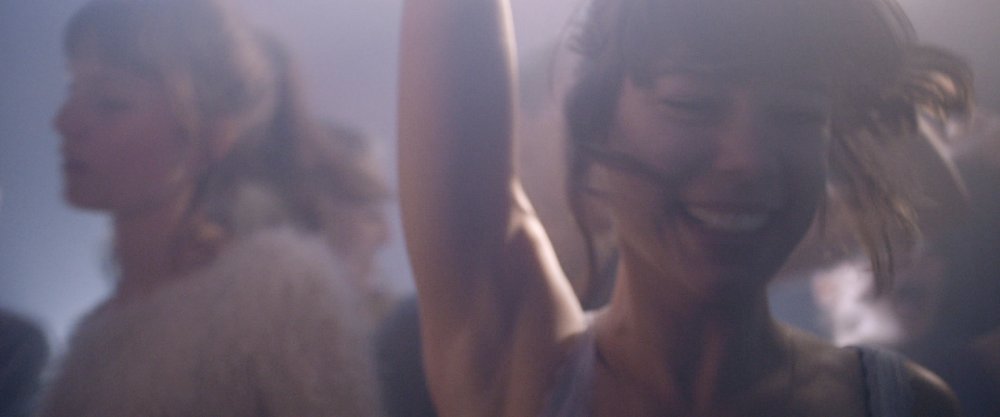Sebastian Schipper’s low-budget drama about a reckless young girl’s excursion into the world of crime would be an ordinary enough affair were it not for the astonishing fact that he and cinematographer Sturla Brandth Grøvlen shot the whole 138 minutes in a single take, roaming the streets of Berlin to encompass 22 different locations en route. Bolstered by an atmospheric score by Nils Frahm and masterful performances by its young leads, who improvised most of the dialogue while carefully hitting their precisely orchestrated cues, the result is a lively and engrossing exercise in creative swagger.
Germany 2015
Certificate 15 138m 25s
Director Sebastian Schipper
Cast
Andi André M. Hennicke
Fuss Max Mauff
Blinker Burak Yigit
Boxer Franz Rogowski
Sonne Frederick Lau
Victoria Laia Costa
[2.35:1]
Subtitles
UK release date 1 April 2016
Distributor Curzon Film World
curzonartificialeye.com/victoria
► Trailer
The single-take gimmick has been alluring for many directors: Hitchcock used the technique to suffocating effect in 1948’s Rope; Alejandro Iñárritu’s 2014 Birdman relentlessly unspooled a man’s life into a one-take, slow-motion meltdown. The effect is always uncomfortable. Denied the punctuation of the cut, the audience never has space to breathe; yet replacing the soothing banality of the shot/reverse-shot structure with a piece of showy technique means it’s harder for us to feel completely immersed in the action. Of course, before digital, one-take films were always an illusion, and even Schipper’s meticulously executed film is apparently a hybrid of three different run-throughs.
The joins, if there are any, are invisible as we descend headlong into the nightmare that overtakes Victoria (Laia Costa) when she leaves a nightclub in the early hours and falls in with a passing group of drunken lads out to make trouble. One of them, Sonne (Frederick Lau), takes a particular shine to Victoria, though they can only communicate in broken English since she is Spanish and he is German. But their increasingly supercharged connection turns dangerous when he drags her into an armed robbery that he and his mates have been coerced into carrying out. Our bafflement at her choices (naive? self-destructive?) is only increased by the unwavering gaze of the camera: despite the fact that she never leaves our sight, Victoria’s motives remain opaque.

It’s at this point, about halfway through, that the film makes a lurching turn from hipsterish whimsy into high-stakes heist thriller – not a transition that most films would survive, and this one does so only by the skin of its teeth. The one-take conceit is both the cause of, and the solution to, Schipper’s problem here: a conventional structure would have allowed him to compress the action and balance the film’s storylines more convincingly, but he is hampered by the strict temporal unity he has imposed on himself. Yet because of the sense of ineluctable propulsion created by Grøvlen’s complex camerawork, which ducks and weaves through the shadows of a long, drunken night, the film makes you want to follow where it leads, even when the plot disregards the most basic requirements of plausibility.
The performances help enormously. Costa is convincing as the lonely outsider who takes a crazy punt on a total stranger and uses the danger of it to drown out her sense of failure and ennui. Lau is equally good as the slippery charmer whose easy lies come bubbling up from an anxious awareness of his lack of money, education and status. It’s one of the film’s more subtle strokes of genius to place a language barrier between Victoria and her new German friends; she is left out of crucial conversations which the audience, with the benefit of subtitles, understand, emphasising not only Victoria’s alienation but her vulnerability. And it’s these gaps and glitches in verbal understanding that make the film’s visual seamlessness even more dangerously seductive.

Schipper doesn’t let Victoria off the hook, however: if she has been seduced by the dream of her own recklessness, she wakes up to discover a hard kernel of ruthless survivalism within herself. Her moral decline is laid out in no uncertain terms: at one point she and Sonne kidnap a baby as a hostage, and the sharply realised terror and anguish of the child’s parents make it clear how far Victoria has fallen. This rock-bottom moment contrasts with the cartoonish villainy of the unconvincing gangster (André Hennicke) who has masterminded the heist: the point seems to be that Victoria has discovered how alarmingly frictionless the slide can be from bored drifter to murderous scumbag.
Such tonal wavering is the main weakness of a film that otherwise simply bulldozes you with its ambition and commitment. Schipper and his cast have managed to turn a gimmick into a surprisingly subtle portrait of a millennial generation overwhelmed by its own unstoppable momentum.
In the April 2016 issue of Sight & Sound

Night moves
Shot in a single bravura 134-minute take, Sebastian Schipper’s Victoria tells the tale of a young Spanish woman on a night out in Berlin who finds herself being roped into a bank robbery, in a film whose dizzying momentum never sacrifices the nuances of character. By Jonathan Romney.
-
Sight & Sound: the April 2016 issue

Tom Hiddleston and the cast and crew of High-Rise talk class and violence past and future – and the rise of cinema’s Ballardian worldview....
-
The Digital Edition and Archive quick link
Log in here to your digital edition and archive subscription, take a look at the packages on offer and buy a subscription.







